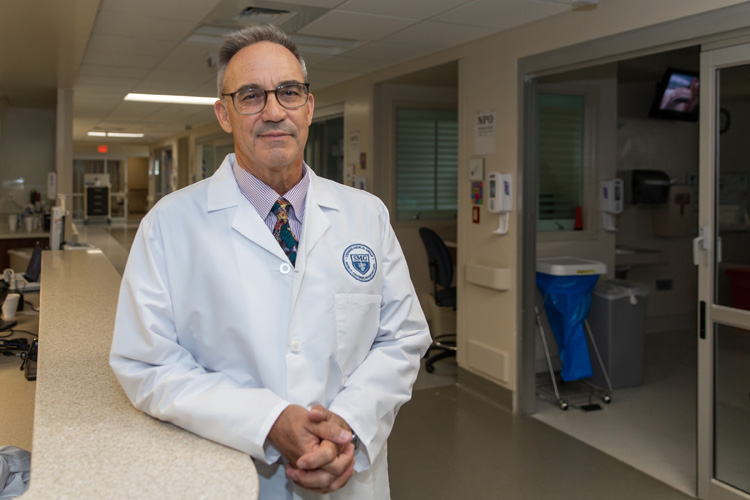
If there’s one diagnosis you never want to get, says Steward Medical Group pulmonologist Dr. Michael Layton, it is IPF, or idiopathic pulmonary fibrosis.
Without hemming or hawing, Layton flatly states IPF “carries a very poor prognosis. Basically, patients come in and we have to tell them, ‘Yeah, you’ve got something and I don’t know what caused it and it’s going to kill you and you’re not going to survive a long time.’”
Since, as Layton says, “the median survival of untreated IPF is about four years,” it’s easy to understand why he calls it “not a good diagnosis to get.”
Unlike with COPD or emphysema, in which patients have difficulty getting air out of their lungs, IPF patients can’t get enough air in. Their lungs become so scarred they can no longer expand.
Adding to the difficult nature of the disease is the fact it is hard to diagnose.
“It can be mistaken for congestive heart failure,” Layton says. “It can be mistaken for an acute pneumonia. A lot of times, because the presentation is over a long period of time, some patients just think, ‘Eh, I’m just getting older. Maybe I’m out of shape.’ It usually presents with shortness of breath, sometimes a dry, non-productive cough.” It can also present with symptoms as simple as fatigue.
“Traditionally,” Layton continues, “the diagnosis of idiopathic pulmonary fibrosis has been made by taking a patient’s history, a physical exam, high-resolution CT scans, and serologic testing to exclude other potential illnesses that can cause something that looks a lot like IPF – things like rheumatoid arthritis, lupus, scleroderma and Sjogren’s disease.
“Many of those disorders can cause a pattern in the lungs that looks a lot like IPF. It can have a Usual Interstitial Pneumonia appearance under the microscope, so we also draw blood to make sure patients don’t have one of those other illnesses – because the treatments for them are very different.”
Because diagnosis is so tricky, patients sometimes have to undergo “open lung” biopsies, a risky, traumatic procedure.
Which is where a bit of good news for IPF patients comes into view.
According to Layton, Sebastian River Medical Center is now working with Veracyte, a company that offers a much less severe screening process that can be used in place of the traditional open lung biopsy procedure.
As Layton explains, open lung biopsies, are major surgical procedures that “require several days in the hospital … If you talk to thoracic surgeons, they’ll tell you that the open lung biopsy is one of the highest risk procedures for complications.”
Now, however, Layton can perform a less debilitating type of biopsy through a thin, flexible tube called a bronchoscope and send the samples he collects to Veracyte for “Envisia” testing.
“Envisia,” according to Layton, “is what they call a genomic classifier. It looks for the 190 most common genes that are associated with IPF. In other words, if you take all of these patients who have IPF and you look at all the samples, what they’ve been able to determine is that there are certain genes that are expressed in patients with IPF in the lung itself,” and that can rule out other conditions that mimic the symptoms of IPF.
In performing this type of biopsy, says Layton, “the risk of a complication is under 3 percent and it’s an outpatient procedure. Somebody comes to the hospital, they get anesthetized, just like in a colonoscopy or an endoscopy. It takes 10 to 15 minutes to do it. The patient is [then] woken up and they go home.”
A few days later, Layton has a genetic profile of the disease he has to treat, though he does admit it’s not infallible.
The Envisia report carries about a 70 percent accuracy rate, but that’s appreciably better than the 40 percent number that high-definition CT scans can offer and Layton is clearly proud to say, “We are the first local hospital to provide this Veracyte genomic testing.”
The net result?
Fewer misdiagnosed cases and greater certainty in prescribing the proper medication for each individual patient.
And there’s some good news on the treatment front, too: There are two new drugs – Esbriet and Ofev – on the market to treat IPF. The drugs don’t cure or stop the progression of the disease, but they do slow progression and make the condition a little easier to live with.
Dr. Michael Layton is with the Steward Medical Group’s Sebastian River Medical Group and Riverside Pulmonary and Internal Medicine. His offices are at 12920 U.S. 1 in Sebastian. The phone number is 772-388-8322.



